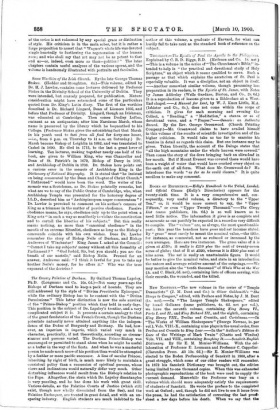Some Worthies of the Irish Church. By the late George
Thomas Stokes. (Hodder and Stoughton. Os.)—This volume, edited by Dr. H. J. Lawlor, contains some lectures delivered by Professor Stokes in the Divinity School of the University of Dublin. They were intended, but scarcely prepared, for publication. Mature consideration might have retrenched some of the particulars quoted from Dr. King's Latin diary. The first of the worthies described is Dr. Richard Lingard, Dean of Lismore 1666, and before that Professor of Divinity. Lingard, though an Irishman, was educated at Cambridge. Then comes Dudley Loftus, eminent as an antiquarian; after him Narcissus Marsh, whose name is preserved by the library which he bequeathed to his College. (Professor Stokes gives the astonishing fact that Marsh in his youth used to fast from aii food for forty-one hours, —i.e, from 6 p.m. on Thursday to 11 a.m. on Saturday.) Dr. Marsh became Bishop of Leighliu in 1682, and was translated to Cashel in 1690. He died in 1713, to the last a great lover of learning. Ten lectures, making together nearly one half of the book, are given to William King, who was Chancellor and Dean of St. Patrick's in 1679, Bishop of Derry in 1691, and Archbishop of Dublin in 1703. Dr. Stokes here points out a curious error in the memoir of Archbishop King in the Dictionary of National Biography. It is stated that "he insisted on being consecrated by the Dean and Chapter of Christ Church." " Enthroned " would have been the word. The writer of the memoir was a Scotchman, as Dr. Stokes pointedly remarks, but what are we to say of the Public Orator of Cambridge, who, when Archbishop Temple was presented for the honorary degree of LL.D., described him as " Archiepiseopum nuper consecratum " ? Dr. Lawlor is provoked to comment on his author's censure of King as a trimmer in the matter of passive obedience. Passive obedience means, he says, obedience only up to the point when a King acts "in such a way as manifestly to violate the constitution and to curtail the liberties of his subjects." But this really means nothing, no more than "canonical obedience" in the mouth of an extreme Ritualist, obedience as long as the Bishop's commands coincide with his own wishes. Does Dr. Lawlor remember the story of Bishop Nene of Durham, and Bishop Andrewes of Winchester ? King James I. asked at the Council : "Cannot I take my subjects' money without all this formality of Parliament ? " "God forbid, Sir, but you should; you are the breath of our nostrils," said Bishop Neile. Pressed for an answer, Andrewes said : "I think it lawful for you to take my brother Neile's money, for he offers it." Who was the true exponent of the doctrine ?






































 Previous page
Previous page